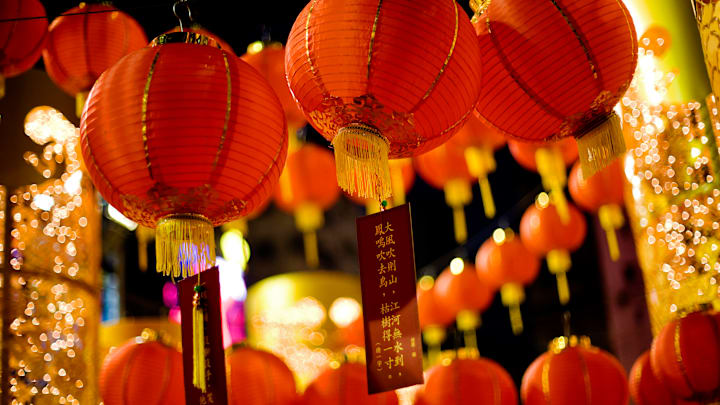Some celebrants call it the Spring Festival, representing a stretch of time that signals the progression of the lunisolar Chinese calendar; others know it better as the Chinese New Year (or Lunar New Year). For a 15-day period beginning on Sunday, January 22 in 2023, China will celebrate the Year of the Rabbit, one of the 12 animals in the Chinese zodiac.
Sound unfamiliar? No need to worry: Check out these 11 facts below about how more than 20 percent of the world’s total population rings in the new year.
1. Chinese New Year was originally meant to scare off a monster.
As legend would have it, many of the trademarks of the Chinese New Year are rooted in an ancient fear of Nian, a ferocious monster who would wait until the first day of the year to terrorize villagers. Acting on the advice of a wise old sage, the townspeople used loud noises from drums, fireworks, and the color red to scare him off—all of which remain major components of the celebration today.
2. There is no set date for the holiday.

In the U.S., New Year’s Eve and New Year’s Day are always celebrated on the same days—December 31 and January 1, respectively—in accordance with the Gregorian calendar. Yet that isn’t the case with Chinese New Year; rather, the start date changes annually to correspond with the lunar calendar. Festivities usually kick off whenever the first new moon of the year occurs (usually by the end of January) and lasts for 15 days, until the next full moon.
3. Some families use Chinese New Year as motivation to clean the house.
While the methods of honoring the Chinese New Year have varied over the years, it is often seen as an opportunity for households to cleanse their quarters of huiqi, or unlucky breaths and/or thoughts from the past year. Cleaning before the stroke of midnight on Lunar New Year’s Eve (in this case, on Saturday, January 21, 2023) is thought to bring good luck, and in the past, families sometimes even performed meticulous cleaning rituals to honor deities that they believed would pay them visits.
4. The celebration will prompt billions of trips.

Because the Chinese New Year places an emphasis on family ties, many people choose to make the trip home during the lunar period. While the COVID-19 pandemic led to travel restrictions over the last few years, experts predict that the holiday rush in 2023 will result in 2.1 billion passenger trips across China, all from mid-January to mid-February.
5. Chinese New Year involves several superstitions.
While not all revelers subscribe to embedded beliefs about what not to do during the Chinese New Year, others try their best to observe some very particular prohibitions. Visiting a hospital or taking medicine is believed to invite ill health; lending or borrowing money will promote debt; and washing or cutting your hair is viewed as washing good fortune away and thought to limit your chances of accruing wealth in the new year.
6. Dumplings are considered lucky.

Dumplings are one of the most popular dishes to feast on during the Chinese New Year. Specifically, Chinese-style dumplings are thought to resemble the gold pieces that were once used as currency in ancient China, and according to legend, the more you eat during the festivities, the more wealth you’re likely to gain in the new year.
7. Oranges and tangerines make great gifts during Chinese New Year.

With their round shapes and golden hues, tangerines and oranges are two fruits that are thought to resemble the sun and help to usher in prosperity over the coming year. They’re one of the best gifts to give during the Spring Festival, as they symbolize the hope that you’ll enjoy good fortune, wealth, and many blessings in the upcoming months.
8. Some people rent boyfriends or girlfriends for the holiday to soothe their parents.
In China, it’s sometimes frowned upon to remain single as you enter your thirties. When singles return home to visit their parents, some might opt to hire a person to pose as their significant other in order to make it appear like they’re in a relationship and avoid parental scolding. On TikTok, some users have started to rent themselves out as boyfriends or girlfriends specifically for the holiday, with prices starting at just under $37 a day for some (although in the past, others earned an average of $145 a day).
9. Red envelopes are everywhere during Chinese New Year.

A tradition during the Spring Festival is to give gifts of red envelopes containing money. (The color red symbolizes energy and fortune.) New bills are expected; old, wrinkled cash is seen as a sign of laziness. People sometimes walk around with cash-stuffed envelopes in case they run into someone they need to give a gift to. If someone offers you an envelope, it’s best to accept it with both hands and open it in private.
10. The festivities can lead to record levels of smog.
Fireworks are a staple of Spring Festival in China, but there’s more danger associated with the tradition than explosive mishaps. Cities like Beijing can experience a significant increase in particulate pollution. In 2016, Shanghai even banned the lighting of fireworks within the metropolitan area.
11. Certain clothing colors are considered bad omens during Chinese New Year.

In China, black clothing and white apparel are traditionally associated with mourning and are largely avoided during the lunar month. The red clothes favored for the holiday symbolize good fortune.
A version of this article was originally published in 2019 and has been updated in 2023.
